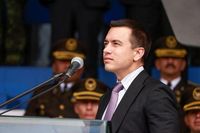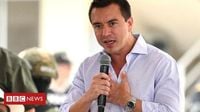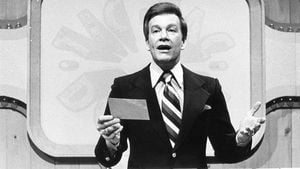On Sunday, April 13, 2025, Daniel Noboa, the president of Ecuador, celebrated what he termed a "historic" victory in the presidential elections, defeating his rival Luisa González by a margin of over one million votes. The National Electoral Council (CNE) announced that Noboa secured 55.88% of the votes against González's 44.12%, a result that has already sparked controversy and claims of electoral fraud from the opposition.
Noboa addressed his supporters from a small stage at his beach house in Olón, located in the coastal province of Santa Elena. He expressed confidence in his victory, stating, "There is no doubt about who the winner is. This victory was historic, with a lead of more than 10 points and over one million votes. The Ecuadorian people have chosen a different path, one that will allow our children to live better lives than we have." His remarks were met with enthusiasm from the crowd gathered to celebrate his re-election.
However, González, representing the leftist Revolución Ciudadana movement, led by former president Rafael Correa, immediately challenged the results. She described the election as "the biggest fraud in the history of Ecuador" and called for a recount of the votes. "We will demand the opening of the polls and a recount. This is the most grotesque fraud we have ever witnessed," she said during a speech to her supporters in Quito.
The backdrop to this election was a tumultuous political landscape in Ecuador. Noboa, who came to power in November 2023 at the age of 37, has faced significant challenges, including rising violence and a struggling economy. Under his leadership, Ecuador has experienced a homicide rate of 38 deaths per 100,000 inhabitants, a figure that has alarmed many citizens. The country has also seen a resurgence of political violence, with the assassination of 30 mayors in the past year, highlighting the intertwining issues of drug trafficking and political instability.
Despite these challenges, Noboa's administration has taken a hard stance on security, militarizing internal security and declaring states of emergency in response to the rising violence. These measures, however, have drawn criticism as many experts argue they have not effectively reduced crime rates, as promised. The average number of daily murders slightly decreased from 22 in 2023 to 19 in 2024, but the overall perception of safety remains low among the populace.
In the lead-up to the election, Noboa's campaign focused on his commitment to tackle drug trafficking and enhance public safety. He emphasized the need for a strong government response to crime, stating, "The Ecuadorians want real changes." His proposals included strengthening public security policies and addressing the country’s economic challenges, which have been exacerbated by a technical recession that began in 2024.
Economically, the situation in Ecuador has deteriorated, with a GDP decline of 0.4% over the past year and significant job losses expected due to ongoing power outages that can last up to 14 hours a day. These blackouts are attributed to a prolonged energy crisis resulting from years of underinvestment in infrastructure. The basic family basket is nearing $800 per month, while the minimum wage is only $470, leaving 28% of the population living in poverty.
Following the announcement of the election results, González's claims of fraud have resonated with her supporters, who believe that the electoral process was manipulated. She accused Noboa of using the CNE and the Electoral Contention Tribunal as instruments of his campaign. "Noboa used the authorities to trample democracy and declared a state of emergency to ensure the grotesque fraud we are witnessing," she stated.
Political analysts have pointed out that Noboa's victory is not just a continuation of his policies but a reflection of the electorate's desire for stability amid chaos. His administration's approach to governance, particularly regarding security and economic reforms, will be closely scrutinized in the coming years. Experts note that while Noboa has garnered support from key sectors, including the military and judiciary, his handling of the energy crisis and crime will be pivotal in determining his effectiveness as president.
In his victory speech, Noboa expressed his determination to implement policies that would foster economic growth and reduce crime, stating, "We will keep working to ensure a better future for all Ecuadorians." He also highlighted his intention to strengthen anti-corruption measures and improve transparency in government operations.
The upcoming four years under Noboa's leadership promise to be challenging as he navigates through the pressing issues of security, economic recovery, and political stability. With the opposition questioning the legitimacy of his victory, the political climate in Ecuador remains tense, and the path forward will require careful management of both public perception and actual governance.
As Noboa prepares to take office again on May 24, 2025, the nation watches closely to see if he can deliver on his promises and address the myriad challenges facing Ecuador.









